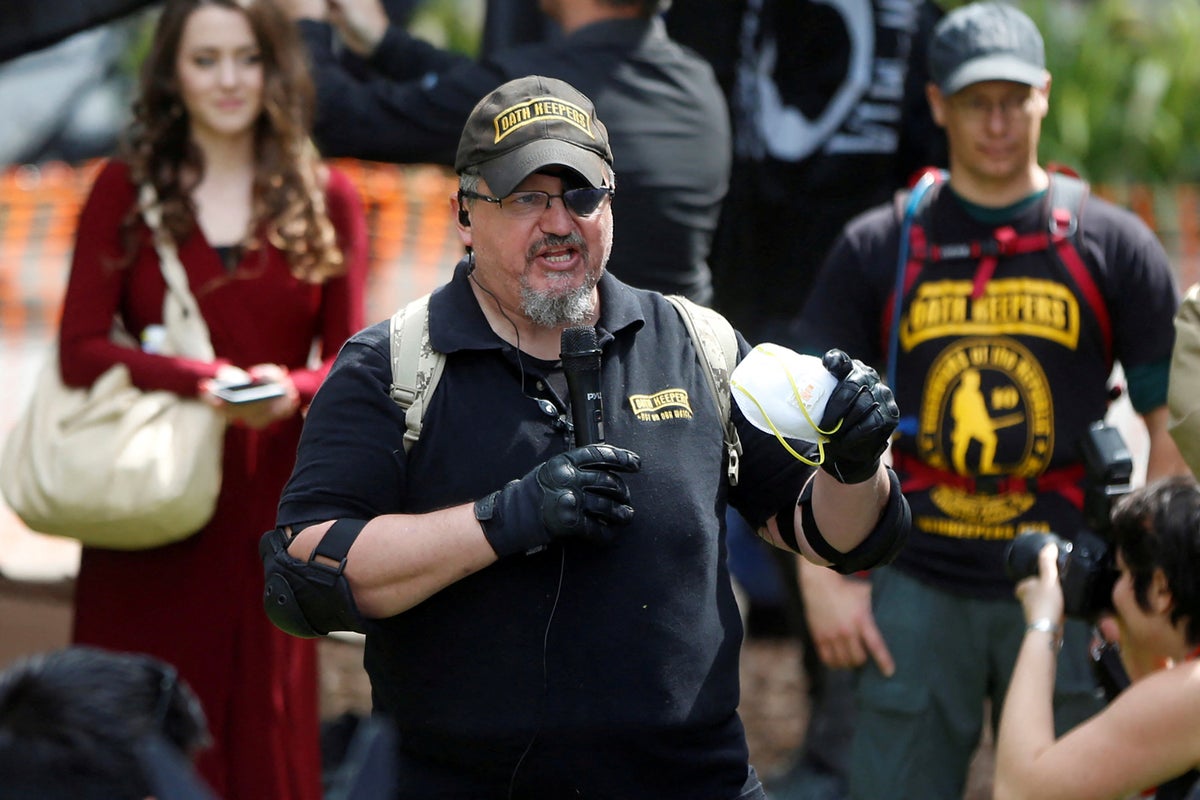
A leaked membership list from an American far-right, anti-government militia group whose members are charged in connection with the Jan 6 attack on the US Capitol includes the names of hundreds of law enforcement officials, members of the military and elected officials.
The list, reviewed by the Anti-Defamation League Center on Extremism, includes at least 81 people who are currently holding public office or are candidates in upcoming elections, from local leadership – including mayors and school board members – to state representatives and senators.
Membership lists also include more than 370 people currently working in law enforcement agencies and more than 100 active military members, according to the report.
The list was published by the Distributed Denial of Secrets, which reportedly obtained membership information for roughly 38,000 people. The ADL Center on Extremism analysed the list – which contained full names, addresses, phone numbers and email accounts – against names found in public databases and social media platforms.
“The range of individuals represented in the Oath Keepers leak shows the extent to which this extremist ideology has gained acceptance,” according to the report. “Even for those who claimed to have left the organisation when it began to employ more aggressive tactics in 2014, it is important to remember that the Oath Keepers have espoused extremism since their founding, and this fact was not enough to deter these individuals from signing up.”
The membership rolls do not prove that those who are listed are or have ever been active members of the group, but the massive size of the list – reaching top law enforcement officials and elected office holders, as well as teachers, paramedics, religious figures and other parts of society – reflects the scale of the group’s recruitment and enrolment efforts.
More than two dozen people connected to the Oath Keepers are charged in connection with the attack on the US Capitol on 6 January.
The group’s founder, Stewart Rhodes, and four other members or people connected to the group have been charged with seditious conspiracy for what federal prosecutors allege was a weekslong campaign plotting to disrupt a joint session of Congress. The alleged campaign included stashing weapons and supplies nearby, to prevent Joe Biden’s presidency and reject the votes of millions of Americans.
A trial is scheduled to begin on 26 September. Mr Rhodes has pleaded not guilty. He could face life in prison if convicted.
The list does not contain people who hold elected office at the federal level, but includes several people holding state-level positions, including Arizona Senator Wendy Rogers, who has previously self-identified as a member and supporter of the group.
Several officials told The Associated Press, which first published the analysis, that they were briefly members of the group or were never dues-paying members.
South Dakota State Representative Phil Jensen provided his state email address to the organisation and purchased an annual membership. He won his Republican primary election on 7 June and will be a candidate in November’s general election. He told Rolling Stone that he was not active with the group.
Idaho State Representative Chad Christensen, who has publicly touted his Oath Keepers membership and appears to have purchased a $10 monthly membership plan, lost his primary election in 2022.
The presence of Oath Keepers members in law enforcement and military roles “creates several challenges and conflicts of interest that can impede how these entities function,” according to the report.
Among the 373 people identified in the Oath Keepers database believed to be currently serving in law enforcement agencies across the US, there are at least 10 chiefs of police and 11 sheriffs.
Those officials are among dozens listed in the leak, though the report notes that the group “did not just draw supporters from the professions they explicitly targeted” but also included “religious figures, teachers, civil engineers, and government employees” – including people with clearances that granted them access to critical infrastructure such as nuclear facilities, according to the report.
“Many of these individuals have roles that make them trusted members of the community who are theoretically in positions to influence people or access sensitive materials or sites,” the report notes. “Though this report focuses primarily on elected officials, police, and the military because of the direct power they can wield over their respective communities, the influence of the Oath Keepers extends to many other sectors of society.”







